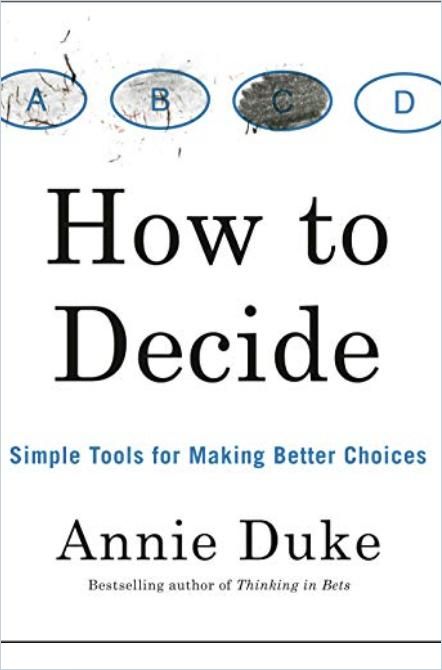Renowned professional poker player Annie Duke offers basic tools and refreshing insights to help you make more productive decisions and reduce regrets about decisions you already made.

Better Decisions
Most people struggle to explain their good decision-making process. Former professional poker player Annie Duke helps you make better choices and indulge in less regret over the choices you’ve already made. She overturns common assumptions, and shares simple, workable tools to help you gauge risks and rewards more accurately. Many people approach decision-making poorly, says Duke, because they don’t confront their biases or seek outside perspectives.
Whether you’re a seasoned executive or a neophyte job hunter, Duke helps you prioritize your options, recognize how you might undermine yourself, keep an open mind, overcome your biases and avoid toxic hindsight.
Decisions
Two things determine the quality of your life, in Duke’s thinking: Your luck and your choices. Making choices essentially means predicting the future and calculating acceptable degrees of risk.
The only thing you have control over that can influence the way your life turns out is the quality of your decisions.Annie Duke
Your intuition can lead to sound decisions, but it isn’t a reliable tool. A good tool has a use value you can repeat. Listing pros and cons isn’t a sound tool, because it amplifies your biases. Making a strong decision requires reflecting on the beliefs that influence you, your potential options and different possible scenarios that will unfold as a result of your choice.
Avoid Hindsight and Outcome Biases
When people’s decisions lead to good outcomes, they assume they’re strong decision-makers. When their decisions lead to poor outcomes, people think of themselves as bad decision-makers. But it’s good or ill fortune plus the effectiveness of your decision-making process that influence the results of your decisions, Duke reminds you, so never judge your decision-making ability on outcomes alone.
When you make a decision, there is stuff you know and stuff you don’t know. One of the things you definitely don’t know is which of all the possible outcomes that could happen will be the one that actually happens.Annie Duke
Don’t engage in hindsight bias – the assumption that the outcomes you experience are inevitable or predictable. Hindsight bias decreases your empathy for yourself when you experience poor outcomes or fail to avoid negative circumstances.
Experience
Your experience of an individual outcome reveals little about the quality of your choices, but strong decision-makers analyze their positive and negative results over time.
Any single outcome doesn’t generally tell us too much about whether a decision was good or bad. But we act like it does. Annie Duke
Visualize possible outcomes as tree branches, with thicker ones representing the likeliest outcomes. Imagine tiny twigs sprouting from the branches, representing realities that outcomes could trigger. Evaluating only the outcome that occurs is like sawing off a branch without comparing it to other branches.
People often lose perspective and view past outcomes as inevitable. A decision tree helps you visualize multiple possible futures.
Consider Divergent Viewpoints.
Many people engage in biased thinking because they rely on their subjective view of a situation, rather than searching for and learning from differing perspectives. For example, Duke says, your intuition is a faulty tool because it only engages your internal view of the world. Consider how other people view a situation before trying to prove your point of view or making a choice based on your point of view.
The person you’re most likely to mislead is yourself. And you don’t know you’re doing it, because you’re living in the inside view. Annie Duke
People often search for facts that prove their beliefs before considering whether other beliefs might be right. Even intelligent people do this, and then craft strong narratives to prove their faulty assumptions.
To form more accurate beliefs, ask what’s objectively true – independent of your perspective – and refer to outside resources. Perspective tracking improves the quality of your choices. Take a sheet of paper, Duke says, and write your subjective or internal views in one column and more objective outside views in another.
Don’t Overanalyze
People invest an average of 250 to 275 hours annually making trivial daily decisions, such as where to buy lunch and what to wear. Invest less time making low-stakes decisions so you have more time to pursue important activities. To figure out which decisions are low-stakes, apply the Happiness Test: Ask whether a decision will affect your happiness in a week, a month and a year. If it won’t matter, spend less time on the decision.
Time is a limited resource that you need to spend wisely.Annie Duke
Make other decisions quickly – such as those you can abandon with reasonable losses and those you can test by making smaller low-stakes decisions first – such as dating different people before settling on a partner. Before making any decisions, Duke advises, ask whether new – as yet undiscovered – information could affect your choice. If not, decide now.
“Productive Negative Thinking”
Imagine yourself succeeding but also picture everything that could go wrong so you are prepared to overcome obstacles.That is productive negative thinking.
Also practice “prospective hindsight,” that is, visualize yourself in the future, having failed to achieve your desired outcome and reflect on why you failed. To make better decisions, also practice “backcasting” – imagining you succeeded and then visualize the steps it took to reach your goal.
When you consider how you might respond to negative outcomes in advance of those things happening, you’re likely to think more rationally.Annie Duke
Identify possible bad outcomes ahead of time to reduce their emotional toll. Conduct a mental premortem to protect yourself by hedging or investing in something to mitigate potential setbacks. Premortems combine prospective hindsights with mental contrasting, which is imagining everything that could possibly go wrong so you’re prepared to overcome obstacles.
Anonymous Feedback
Keep outcomes to yourself when you solicit feedback. For example, ask people what they would do in a situation you’re analyzing, as opposed to explaining your decisions and asking if they agree. Along the same lines, Duke says, when you solicit team feedback, keep individual feedback anonymous so people don’t change their opinions to match their colleagues’ ideas.
Your future self is depending on you to make quality decisions and keep improving them. Real self-compassion is about not letting that person – all the future versions of yourself – down. Annie Duke
When you’re making decisions, keep an open mind and practice self-compassion. Don’t defensively search for reasons to prove you are right.
Unsympathetic Revelations
Annie Duke is a once-academic who made her name as a tough poker player. She brings the hard-edged common sense and relatively unsympathetic tone of someone who earned her success one tactical choice at a time. Duke’s clear-headedness stands out as she urges you to escape your delusions and embrace clarity. No easy tasks, but Duke offers tools that let you move outside your usual patterns. Her most productive lessons are her arguments against rehashing old choices, whether they turned out for good or ill. Like any poker player calibrating when to show her hand, Duke offers revelations large and small.
Annie Duke also wrote Thinking in Bets: Making Smarter Decisions When You Don’t Have All the Facts and Quit: The Power of Knowing When to Walk Away. She co-wrote Decide to Play Great Poker: A Strategy Guide to No-Limit Texas Hold ‘Em and The Middle Zone: Mastering the Most Difficult Hands in Hold’em Poker with John Vorhaus. She co-authored her autobiography, Annie Duke: How I Raised, Folded, Bluffed, Flirted, Cursed, and Won Millions at the World Series of Poker with David Diamond.











